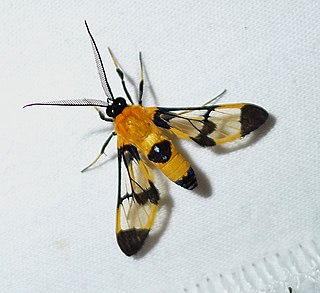| Loxophlebia asmodeoides | |
|---|---|
| Scientific classification | |
| Kingdom: | Animalia |
| Phylum: | Arthropoda |
| Class: | Insecta |
| Order: | Lepidoptera |
| Family: | Arctiidae |
| Genus: | Loxophlebia |
| Species: | L. asmodeoides |
| Binomial name | |
| Loxophlebia asmodeoides Rothschild, 1931 | |
Loxophlebia asmodeoides is a moth of the Arctiidae family. It was described by Rothschild in 1931. It is found in Colombia. [1]

Moths comprise a group of insects related to butterflies, belonging to the order Lepidoptera. Most lepidopterans are moths, and there are thought to be approximately 160,000 species of moth, many of which have yet to be described. Most species of moth are nocturnal, but there are also crepuscular and diurnal species.

Lionel Walter Rothschild, 2nd Baron Rothschild, Baron de Rothschild,, was a British banker, politician, zoologist and scion of the Rothschild family. As a prominent Zionist leader, he was presented with the famous Balfour Declaration which pledged to a Jewish national home in Palestine. Rothschild was the President of the Board of Deputies of British Jews from 1925 to 1926.

Colombia, officially the Republic of Colombia, is a sovereign state largely situated in the northwest of South America, with territories in Central America. Colombia shares a border to the northwest with Panama, to the east with Venezuela and Brazil and to the south with Ecuador and Peru. It shares its maritime limits with Costa Rica, Nicaragua, Honduras, Jamaica, Haiti, and the Dominican Republic. Colombia is a unitary, constitutional republic comprising thirty-two departments, with the capital in Bogotá.

